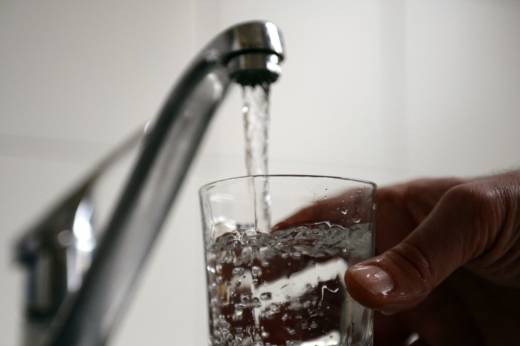The couple now receives tokens from the water district to receive free filtered water. Their drinking water also contains the toxins arsenic and chromium-6.
“But the tokens aren’t enough,” Bartolo Chavez says. “So in addition, we buy bottled water at Costco.”
Bartolo works in the juice industry and Celerina is a hotel worker. They pay about $50 a month for the extra bottles — a price they say they can ill afford.
[TCP]
The State Water Resources Control Board on July 18 adopted the strictest possible standard (5 parts per trillion or less) for the contaminant in public drinking water. That's the lowest level at which existing technology can detect the chemical and remove it.
Statewide, the tap water of about a million Californians is known to contain TCP at levels higher than that, according to data from the state water board.
In California, the contamination is tied to the historic use of industrial solvent. TCP has been found in many urban areas, including Los Angeles, San Bernardino and San Mateo counties.
But in the agricultural Central Valley, it’s linked to a type of pesticide once made by two manufacturers, Shell Oil and Dow Chemical.
From at least the 1950s into the 1980s, farmers spread the pesticide on fields to kill tiny, soil-dwelling worms that attacked the roots of plants, causing millions of dollars in crop losses.
“It is extremely persistent,” says Todd E. Robins, a San Francisco attorney representing more than two dozen Central Valley water suppliers that are now suing Shell and Dow for the cost of cleanup.
“TCP lasts in the ground and in the groundwater for literally centuries," he adds.
Starting in January 2018, all public water systems in the state -- more than 4,000 of them -- must test for TCP. If the average of four quarters of sampling shows the chemical exceeding levels of the new limit, the state will require cleanup, says Andrew DiLuccia, spokesman for the water board.
And that won’t be cheap.
“Currently we have an estimation of approximately a little over $33 million a year,” DiLuccia says. Over the next 20 years, the state estimates $500 million in cleanup may be necessary.
“But that could change as more systems begin to test,” he adds.
Attorney Robins claims some of the TCP pollution in the agricultural areas of California could have been avoided. According to the lawsuits he has filed, both Shell and Dow knew early on that TCP was not an active ingredient in the pesticide — rather, it was a different chemical in the pesticide that actually killed the worms.
And yet, Robins says, both companies kept putting TCP in their pesticides as a way to get rid of their TCP inventories.
“Rather than spending money to dispose of this chemical waste,” Robins explains, “they could put it in barrels and sell it to farmers and have farmers dispose of the chemical waste in soil and in farm fields all around the United States.”
Public relations representatives for Shell and Dow wouldn’t comment on whether discarding TCP was a motive for adding it to the pesticides, citing the lawsuits.
Dow spokesman Jarrod Erpelding released a statement saying:
"TCP was a trace constituent associated with highly beneficial agricultural product formulations, which have not been on the market for several decades, that controlled pests that otherwise would have caused millions of dollars in annual crop losses. TCP is also associated with products that Dow did not manufacture or sell and with certain industrial processes in which Dow had no involvement. All regulations should be predicated on sound science, and the MCL [Maximum Contaminant Level] for TCP is no different."
Shell representatives emailed a statement:
“The former Shell agricultural product, last manufactured more than 30 years ago, contained trace amounts of 1,2,3 trichloropropane (TCP). It was used to control microscopic worms that attacked crops causing millions of dollars a year of crop loss for farmers, and was approved for use by the U.S. government and the State of California.”
Many of the hardest-hit California communities are rural, with small water districts that won't be able to afford the cleanup costs. Among them is the water supplier for the city where the Chavez family lives: Arvin, on the outskirts of Bakersfield in Kern County.
“It’s something that’s going to place a humongous burden on the residents of Arvin,” says Raul Barraza Jr., general manager of the Arvin Community Services District. “You’re talking about very complex treatment ... each water system has its completely own personality.”
Barraza says water suppliers will have to decide whether to treat TCP on-site or whether to pipe the contaminated water to a central treatment facility. In either case, Barraza says, they’ll likely be running it through a granular activated carbon filter, much like a Brita filter placed in a pitcher of water – only a lot bigger.
“They’re generally 20,000-pound vessels,” says Lisa Koehn, assistant public utilities director for the city of Clovis, near Fresno. “And they’re about 12 foot in diameter, about 20 feet tall.” And costly to operate, she says.
Clovis recently settled a lawsuit against Dow Chemical for $7.5 million. The city also won a jury verdict in its favor after suing Shell Oil, then settled with the company for $15 million, says David J. Wolfe, city attorney for Clovis.
Koehn cautions that the settlement monies aren't likely to cover all the costs of cleanup. To do that, she says, taxpayer-funded grants and higher water fees will likely be needed.
The state attorney general’s office would not comment on whether it’s also pursuing legal action against the companies.
Robins, meanwhile, says none of this had to happen.
“The real tragedy is the active ingredient in these products was extremely effective,” he says. “It broke down into harmless byproducts in a matter of days after these products were injected into the soil.”
